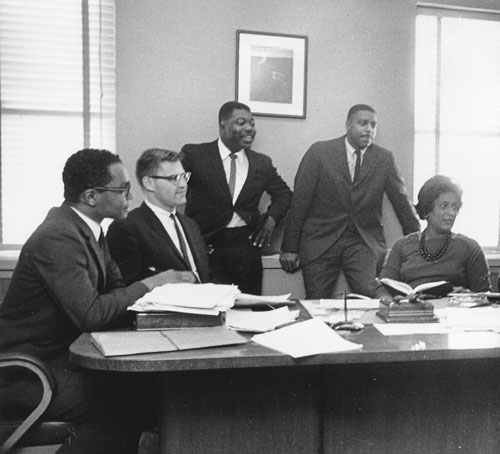Last week I spent two days using these records. My research was focused on records related to the NAACP L
 egal Defense Fund in the early 1960s, and the role of civil rights lawyers through that decade. The files of the Legal Defense Fund itself, most unfortunately, remain closed, but civil rights historians can find part of the LDF story in the papers and memoirs of individual lawyers. Bell’s papers include material from his work on James Meredith’s ultimately successful effort to integrate the University of Mississippi. They include notes used for speeches Bell gave at NAACP local chapters in the South. Used in one speech was a letter from another African American student at Ole Miss, detailing the way he was treated by whites on campus. Voluminous correspondence during these years includes letters from his proud mother, who affectionately tells her son in 1960 to "behave yourself."
egal Defense Fund in the early 1960s, and the role of civil rights lawyers through that decade. The files of the Legal Defense Fund itself, most unfortunately, remain closed, but civil rights historians can find part of the LDF story in the papers and memoirs of individual lawyers. Bell’s papers include material from his work on James Meredith’s ultimately successful effort to integrate the University of Mississippi. They include notes used for speeches Bell gave at NAACP local chapters in the South. Used in one speech was a letter from another African American student at Ole Miss, detailing the way he was treated by whites on campus. Voluminous correspondence during these years includes letters from his proud mother, who affectionately tells her son in 1960 to "behave yourself."Bell donated his papers to NYU a few years ago. Much of the extensive collection has been processed and is open. Some files are restricted. The papers are housed on the 10th floor of Bobst Library at NYU. The archive has prepared an excellent finding aid, which describes the collection.
Of particular significance is the papers’ extensive documentation of the history of race in American legal education, from Bell’s forthright letter to Harvard Law School Dean Derek Bok in 1969, laying out the terms that would make a Harvard position attractive to him, and why it was that the law school needed him, through his mentoring of students during the era of Black Power on campus, to the struggles that would engulf both Bell and the legal academy.

Bell’s own ideas about race and the law can be traced, of course, through his extensive published works. But in these records, researchers can see the arguments a young lawyer would make about law and social change from the late 1950s through the height of the civil rights movement, and through the difficult later years during which he would produce his most searing works. These papers are the source for a great biography, if they find the right author.
Researchers interested in the Derrick Bell Papers should contact the Archives before arriving for research. Information about access to the archives is here. Here are some tips not on the website:
To enter Bobst Library, you must first visit the Permissions window to the left as you enter the lobby. The rules for library access for non-NYU students and faculty are here. To avoid delays, be ready to tell them exactly where you are going (University Archives, rather than Derrick Bell Papers). Bring ID showing your affiliation with a college or university. If you are an independent scholar or writer, ask the archivist what to bring, and keep with you a print-out of e-mail correspondence with the Archive regarding your visit. You will need to visit the Permissions window and repeat this process every day. (I encountered no difficulties and it was quick, however a student in line in front of me had trouble getting through, so it's good to be prepared to ensure that you don't waste time.) The Permissions window opens when Bobst opens (earlier than the Archives), so you can take care of this without cutting into research time.
The Archive reading room is small, and access to electrical outlets is awkward. If you can, bring a back-up laptop battery. As is the usual practice, you may use pencils but not pens for note taking. Paper and pencils are not provided – bring your own. You are not barred from bringing books or other reference sources into the reading room.
The boxes listed on the finding aid are not the conventional 4 or 5 inch wide document boxes, but instead are much larger boxes, perhaps 12 to 15 inches wide. This means that the contents of each box may be more voluminous than you would otherwise anticipate.
The staff is very professional and helpful. Boxes were provided promptly, copies quickly made and problems resolved efficiently. The staff is small, so you may need to be patient if several researchers are present at one time.
Recommended reading before you go: The Derrick Bell Reader, Richard Delgado and Jean Stefancic, eds., and Bell's books. A selected list is here.
Photo credits: Derrick Bell, LDF lawyers 1962 (Bell on left), HLS protest.